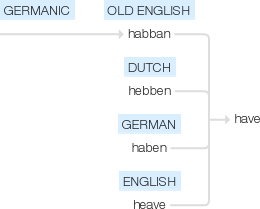Have
Old English habban, of Germanic origin; related to Dutch hebben and German haben, also probably to heave.
wiktionary
From Middle English haven, from Old English habban, hafian(“to have”), from Proto-Germanic *habjaną(“to have”), durative of *habjaną(“to lift, take up”), from Proto-Indo-European *kh₂pyéti, present tense of *keh₂p-(“to take, seize, catch”). Cognate with Saterland Frisian hääbe(“to have”), West Frisian hawwe(“to have”), Dutch hebben(“to have”), Afrikaans hê(“to have”), Low German hebben, hewwen(“to have”), German haben(“to have”), Danish have(“to have”), Swedish hava(“to have”), Norwegian Nynorsk ha(“to have”), Icelandic hafa(“to have”), Albanian kap(“I grab, catch, grip”) [1] [2], Latin capiō(“take”, verb), Russian хапать(xapatʹ, “to seize”). More at heave.
Since there is no common Indo-European root for a transitive possessive verb have (notice that Latin habeō is not etymologically related to English have), Proto-Indo-European probably lacked the have structure. Instead, the third person forms of be were used, with the possessor in dative case, compare Latin mihi est / sunt, literally to me is / are. [3]
From have on(“to deceive”).
etymonline
have (v.)
Old English habban "to own, possess; be subject to, experience," from Proto-Germanic *habejanan (source also of Old Norse hafa, Old Saxon hebbjan, Old Frisian habba, German haben, Gothic haban "to have"), from PIE root *kap- "to grasp." Not related to Latin habere, despite similarity in form and sense; the Latin cognate is capere "seize.
Sense of "possess, have at one's disposal" (I have a book) is a shift from older languages, where the thing possessed was made the subject and the possessor took the dative case (as in Latin est mihi liber "I have a book," literally "there is to me a book"). Used as an auxiliary in Old English, too (especially to form present perfect tense); the word has taken on more functions over time; Modern English he had better would have been Old English him (dative) wære betere.
To have to for "must" (1570s) is from sense of "possess as a duty or thing to be done" (Old English). Phrase have a nice day as a salutation after a commercial transaction attested by 1970, American English. Phrase have (noun), will (verb) is from 1954, originally from comedian Bob Hope, in the form Have tux, will travel; Hope described this as typical of vaudevillians' ads in Variety, indicating a willingness and readiness to perform anywhere.
